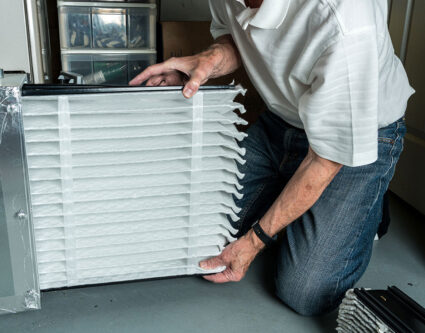Keeping Cool About Cooling in 2023
 When the heat outside is getting too high for comfort in Aurora, Oswego, Plainfield, Naperville and Lisle (IL), you want a ready call-and-response team that keeps you cool.
When the heat outside is getting too high for comfort in Aurora, Oswego, Plainfield, Naperville and Lisle (IL), you want a ready call-and-response team that keeps you cool.
Here at Beery, keeping cool has more than one meaning. Beyond maintaining air comfort and quality, we also make sure you can stay cool (as in steady) with the right information and outlook about HVAC.
As we continue into another summer of AC running at its peak levels, let’s touch on a few things for remaining an informed HVAC consumer – in other words, things that keep you cool about cooling.
2023 HVAC Regulation Changes
In case you didn’t already know, on January 1, 2023, the U.S. Department of Energy (DOE) raised the minimum efficiency standards for air conditioners.
Since 1987, the standards have been measured by a unit’s SEER (seasonal energy efficiency ratio) rating. Higher SEER ratings identify increasingly efficient systems (e.g. an 18 SEER is more efficient than a 16 SEER).
Before this year, the minimum rating required for manufacturing a new air conditioner was 13 SEER. On January 1, DOE increased that minimum to 14 SEER2 for the northern states, including Aurora, Oswego, Plainfield, Naperville and Lisle (IL).
SEER2 is a new rating metric that reflects updated test procedures that are stricter and more accurate for air-conditioner manufacturers. As an example, a newly built air conditioner with a 14 SEER2 rating will correctly represent DOE’s 2023 manufacturing and testing standards. A unit built in 2021 with 14 SEER rating will have a SEER2 rating of 13.4 in 2023, indicating it doesn’t meet the current updated standard.
What this mainly means to you is that while you can still install a system made before January 1, a newly manufactured system installed during and after 2023 will be built to even greater specifications that ensure better efficiency.
You will typically use less energy to run the new systems, which favors both your utility bills and the environment. This becomes notable when we consider that energy prices will potentially continue to rise in the foreseeable future.
These new systems also will cost more than those made before 2023. This is because producing the new air conditioners requires more-expensive parts for compliance. In addition, part acquisition had already been contending with supply-chain issues before January 1, and related expenses may remain a cost factor for the new models.
Common AC Problems You Can Stay Ahead Of
During the decades we’ve served Naperville, Aurora, Plainfield, Oswego and Lisle, we’ve seen just about every AC problem you can imagine.
If you’re reading this, you may be a proactive consumer who would rather enjoy comfort and spend less doing so by avoiding issues that can interfere with that goal. In keeping cool about cooling, let’s review some things you can be alert to if you notice your AC is starting to struggle.
Low refrigerant. Without the right amount of refrigerant routing through the system, your AC cannot complete its exchange of heat from inside the house to outside the house. Even a small loss or leak can notably reduce system performance.
Low refrigerant further can cause the evaporator coil to frost because the coil can’t absorb enough heat to warm the refrigerant. Reduced refrigerant can overheat and damage the compressor motor as well, and replacing the compressor can be costly. (Note that dirty coils also can prevent heat dissipation.)
Water leaks. HVAC systems produce moisture as a result of operating. Air conditioners create what’s called condensate, which is moisture that is pushed through drain pipes and then away from the home. If the system’s condensate drainage gets backed up or clogged, it will leak and could lead to mold as well as electrical or structural damage.
Improper size or installation. You wouldn’t expect an air conditioner to be wrongly sized or installed when you add it to your house, but we’ve seen it plenty of times. In either case, the result can be erratic air pressure and unreliable system efficiency.
No cold spot. Your cooling system is designed to push and distribute cold air into your home until it achieves the thermostat setting. If the system cannot locate the coldest spot, it may not know how to properly circulate air and when to stop running. This can place a lot of strain on the air conditioner while driving up energy costs.
Then of course’s there’s culprit number one: the air filter. It has been and perhaps will always be the main and most overlooked reason an air conditioner runs into trouble. A dirty filter restricts airflow and invites a range of other problems. By now the old adage is likely familiar: Be sure to check and change the filter every 30 to 60 days in the summer.
Here for Answers and Service
Here at Beery Heating and Cooling, we really do enjoy helping you keep cool about cooling as it concerns both your comfort and consumer awareness. If you have any questions about your AC or would like to schedule maintenance in Naperville, Aurora, Plainfield, Oswego or Lisle this summer, just give us a call at (630) 585-6444!
